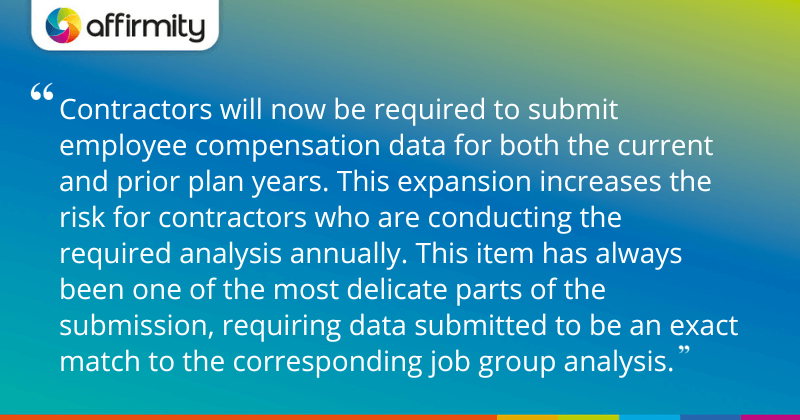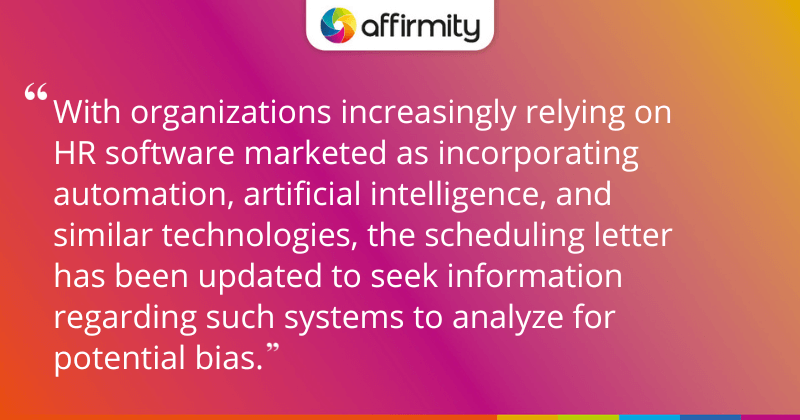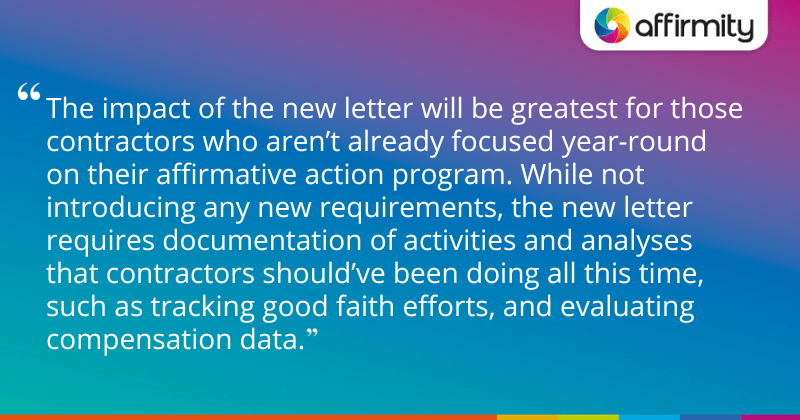As of August 2023, the OFCCP has announced significant updates to the Combined Scheduling Letter and Itemized Listing that it sends to all federal contractors selected for audit. Furthermore, the modified letter has gone into immediate effect, now requiring employers to gather and submit more for the initial response than ever before. Read on to discover what’s new and what you need to know for any future audit activity.
6 New Requirements In the Updated Scheduling Letter and Itemized Listing
The changes, announced on Friday, August 25, 2023, require organizations to submit a larger collection of supporting data and documentation proving the existence and effectiveness of their policies. Key changes have been made regarding compensation data, the use of AI and automation in HR processes, and promotion policies and procedures. This is alongside new demands regarding Executive Order 11246, Section 503 and VEVRAA outreach, and Section 503 utilization.
Let’s look at the details of the changes.

1) Current and Prior Plan Year Compensation Data Submission
Contractors will now be required to submit employee compensation data for both the current and prior plan years. Additionally, contractors must now provide documentation proving they have evaluated their compensation systems for disparities by gender and race/ethnicity, including:
- The date of the analysis
- How many employees were included in or excluded from the analysis
- What forms of compensation were analyzed
- How the different forms were separated or combined for the analysis
This expansion to two years of compensation data increases the risk for contractors who’ve not been conducting the required analysis annually. This item has always been one of the most delicate parts of the submission, requiring data submitted to be an exact match to the corresponding job group analysis. Contractors will now have to ensure that a robust check and full analysis are performed for both years.
MORE FROM THE BLOG | ‘8 Big AAP, EEO, and DE&I Themes From Our NILG 2023 Advice Board’
2) Disclosure of AI and Automation Use
With organizations increasingly relying on HR software marketed as incorporating automation, artificial intelligence, and similar technologies, the scheduling letter has been updated to seek information regarding such systems to analyze for potential bias. Contractors must now provide information and documentation about the policies, practices, or systems they use to recruit, screen, and hire wherever those systems use:
- Artificial intelligence
- Algorithms
- Automated systems
- “Other technology-based selection procedures”
3) Action-Oriented Program and Contractor Outreach Evidence
In recent years we’ve seen the OFCCP place greater emphasis on having contractors prove that they’re taking the actions identified in their plans, and evolving their approach based on what those actions achieve. This stance is reflected in the changes to the scheduling letter across Executive Order 11246, Section 503, and VEVRAA.
Regarding Executive Order 11246 AAP (covering females and minorities), contractors must now provide documentation of their action-oriented programs designed to correct any problem areas identified in the plan, including those for the prior AAP year. Previously, this information was sought only in follow-up requests where warranted.
With regards to both Section 503 and VEVRAA, contractors must also provide documentation of their outreach and positive recruitment activities, as well as a more detailed evaluation of their effectiveness. If the contractor’s evaluation determines these efforts were ineffective, they must also provide detailed documentation describing the alternative efforts that were implemented.
RELATED READING | ‘4 Reporting Views That Will Help You Better Monitor Your Affirmative Action Outreach Efforts’

4) Additional Requirements for Section 503 Utilization Analyses
In addition to the usual utilization analysis for individuals with disabilities, contractors must now describe all steps taken to determine whether any impediments to equal employment opportunities exist in areas where underutilization is identified. If the organization is six months into its new plan year when the scheduling letter is received, this analysis must cover both the prior AAP year as well as the current year.
5) Additional Context for Your Promotions Data
In addition to handing over their promotions data, contractors must now provide documentation of all applicable policies and procedures related to promotions. Contractors also have the option to include whether promotions were competitive or non-competitive in the submission data.
6) Copies of a Range of EEO Policies
Contractors must now provide copies of equal employment opportunity policies including:
- Anti-harassment policies
- Complaint procedures
- Any other policies on employment agreements that impact employee equal opportunity rights and complaint procedures (for example, your policies on arbitration agreements)
UP NEXT | ‘4 Signs That Your Applicant Data Won’t Pass an OFCCP Audit’

In Conclusion: The New Parameters for Preparation
The OFCCP first made its proposed changes available for comment in late November 2022 (with a revised version available in April 2023). However, the timing of the finalized version was uncertain—the OFCCP keynote at the recent National ILG conference (held in early August), offered no hints. So for many contractors, the appearance of new requirements may be rather sudden.
The impact of the new letter will be greatest for those contractors who aren’t already focused year-round on their affirmative action program. While not introducing any new requirements, the new letter requires documentation of activities and analyses that contractors should’ve been doing all this time, such as tracking the effectiveness of good faith efforts, and evaluating compensation data for gender and race/ethnicity disparity.
As always, Affirmity strongly recommends that contractors become as prepared as possible. Plans should be prepared, reviewed, and readied for the possibility of an audit, as there are only 30 days in which to prepare prior to submission. If the contractor appears on the CSAL, the scheduling letter could follow in short order.
These new requirements only increase the importance of ensuring you have a compliant affirmative action program that goes beyond basic plan preparation. With more data to pull and more documentation to locate, organizations starting from zero and scrambling to respond to an audit notice only have further to go—and the OFCCP isn’t providing any extra time to get it done. With the new letter effective immediately, the sooner you act to add the new items to your audit preparation procedure, the better.
Get expert guidance with our affirmative action support and services—contact us today for more information.
About the Author
 Zoe Ann Whitley, PHR, is a Director of Consulting Services at Affirmity. In this role, she leads and manages a team of Affirmity consultants who provide audit support and consulting on affirmative action, equal employment opportunity, and diversity. She has over 20 years of compliance experience, including serving as a compliance manager for a large federal contractor.
Zoe Ann Whitley, PHR, is a Director of Consulting Services at Affirmity. In this role, she leads and manages a team of Affirmity consultants who provide audit support and consulting on affirmative action, equal employment opportunity, and diversity. She has over 20 years of compliance experience, including serving as a compliance manager for a large federal contractor.
Ms. Whitley’s experience spans US and Canadian compliance, affirmative action, employee relations, recruitment, diversity, and training. With her deep expertise in this industry, she is regularly relied upon to provide guidance to the Affirmity auditing team and to participate in executive briefings and client training.
